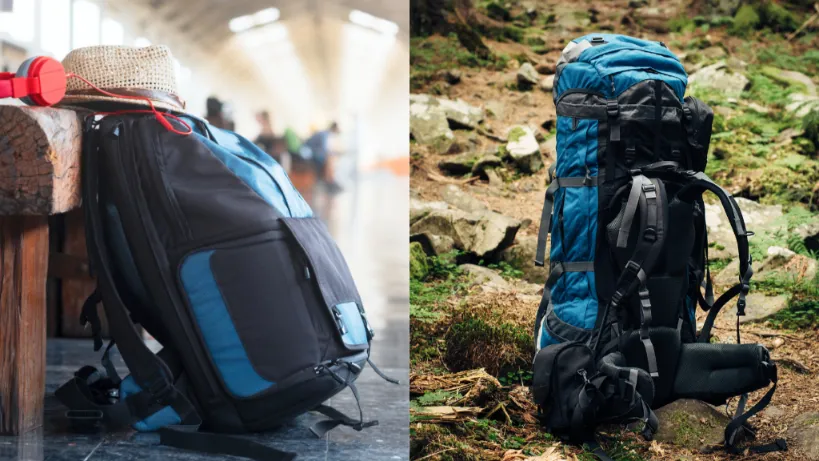Packing light is an art form, and it starts with the very thing we’re packing into – our hiking backpack.
According to TravelFreak, the average multi-day hiking backpack tips the scales at about 4.5 pounds. That’s before you even start piling in your tent, sleeping bag, and extra pair of socks “just in case.”
But what if I told you that you could slash that weight in half before you even start packing?
In this article, we’re going light. Super light. We’re talking about lightweight hiking backpacks that weigh no more than 2 pounds with the capacity up to 60 liters.
These packs punch well above their weight class, offering incredible value, durability, and comfort, all while keeping things light on your shoulders. They’ve become favorites in the hiking community for a good reason.
What Are the Best Lightweight Hiking Backpacks?
Best Overall/Best Versatility: Deuter Speed Lite | For Men (1 lb. 15 oz.) | For Women (1 lb. 13.6 oz.)
Best for a Day Hike: Osprey Daylite Pack | Check Price (1 lb. 1 oz.)
Best for an Overnight Hike: Osprey Skarab/Skimmer Hydration Pack | For Men (1 lb. 10.2 oz.) | For Women (1 lb. 8.5 oz.)
Best for a 3-5 Day Trip: REI Co-op Flash Air 50 Pack | For Men (1 lb. 13 oz.) | For Women (1 lb. 12 oz.)
Best for a 5+ Day Trip: Granite Gear Crown3 60 Pack | For Men (2 lbs. 3 oz.) | For Women (2 lbs. 3 oz.)
Deuter Speed Lite
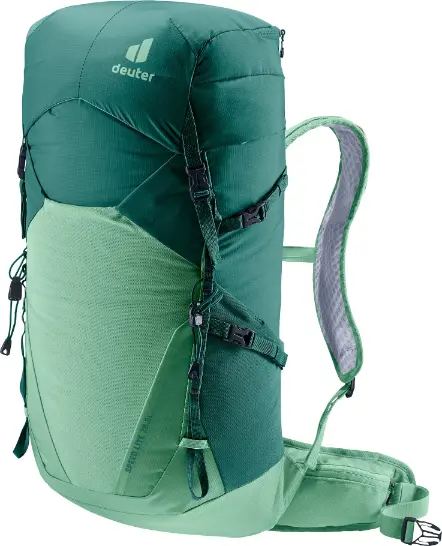
KEY FEATURES
PROS
CONS
This backpack has become my go-to for both quick day hikes and those longer, muti-day treks. I genuinely think that its versatility is unmatched.
Weighing in at just 1 lb. 13.6 oz. to 1 lb. 15 oz., it’s very lightweight as for a backpack with this capacity.

Being lightweight often means sacrificing durability, but not with this backpack. Made from recycled polyester, this pack doesn’t skimp on durability. It’s eco-friendly and tough.
With a 28-liter capacity for the women’s version and 30 liters for the men’s, you’ve got plenty of space. The 7 exterior pockets give you quick access to your smaller items, making organization much easier.

The Lite back system definitely sets this backpack apart. This is Deuter’s lightest, most minimalist back system yet. It ensures stable and comfortable load distribution thanks to a flexible, tensioned Delrin U-frame coupled with a ventilated and padded back panel.
Side compression straps work beautifully by regulating pack volume and minimizing load wobble, saving you precious energy on the trail.
The ergonomically shaped, vest-style, perforated shoulder straps are another highlight. They come with pouches for those must-have items you need within arm’s reach. Though, I do wish the pockets on the shoulder straps were a bit larger to fit my phone comfortably.
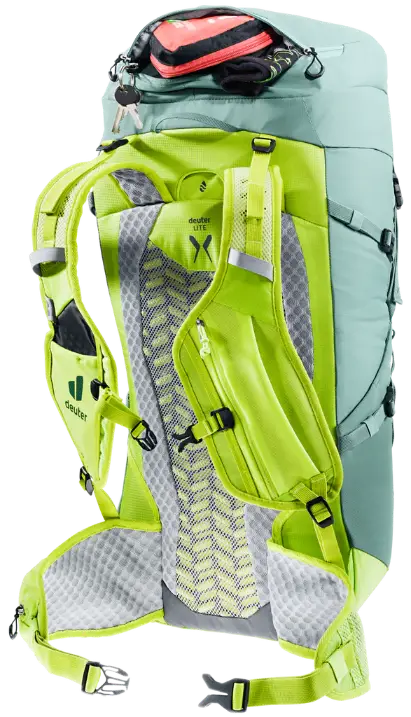
The hydration-compatible design is a lifesaver on long hikes, though you’ll need to add your own reservoir.
Verdict
This backpack is perfect for any hiker, backpacker, traveler, or camper. It’s a sizable bag that can hold a lot, yet remains astonishingly lightweight. It’s sturdy, with plenty of pockets and spots for all your stuff.
I’m genuinely impressed with how versatile and lightweight the Deuter Speed Lite is. It’s earned a permanent spot in my hiking gear lineup!
Osprey Daylite Pack

KEY FEATURES
PROS
CONS
The Osprey Daylite Pack tops our ranking of the best small backpacks for day hiking, and it wins in this category in this ranking too.
It’s lightweight, weighing in at just 1 lb. 1 oz. Of course, you could easily find 3-4 ounces lighter options like Black Diamond Bbee, but I find the Osprey Daylite to be simply the best daypack not only for hiking, but also travel as it squeezes into tight spots on tour buses easily, thanks to its compact size, while still providing ample space.

With a 13-liter capacity and a large panel-loading main compartment, you’ve got space for essentials like a rain jacket, water bottle, and even umbrella. The multifunctional interior sleeve is versatile enough for a hydration reservoir, laptop, or tablet.
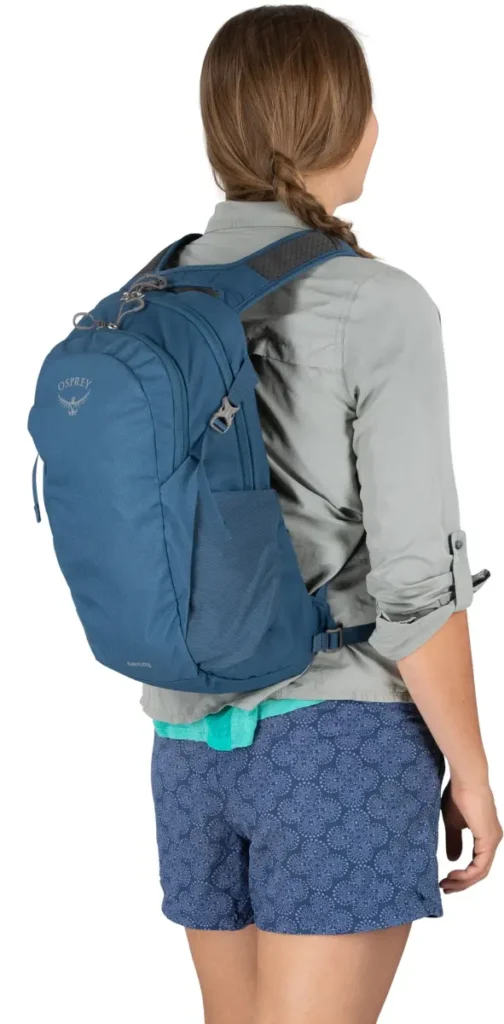
The water bottle pockets are a bit on the snug side so jamming a giant water bottle in there is out of question. However, anything less than 24 oz will fit just fine.
Another thing to keep in mind is that getting the water bottle back into its side pocket without taking the pack off can turn into a problem. The trade-off is that the snug pockets prevent items from falling out when you’re on the move.

Verdict
The Osprey Daylite Pack is a practical, lightweight and versatile daypack that excels at both hiking and travel. Its compact size makes it perfect for squeezing into tight spaces, while its interior sleeve provide ease of organization.
Despite the snug side pockets, this pack’s overall design more than makes up for it, earning its spot as our top choice for lightweight daypacks.
Osprey Skarab/Skimmer Hydration Pack

KEY FEATURES
PROS
CONS
This backpack has two versions – Skarab for men and Skimmer for women. They share similar features but are tailored for men and women respectively.
These packs are a dream for anyone looking to keep their load light without skimping on essentials. Weighing in at just 1 lb. 8.5 oz. to 1 lb. 10.2 oz., it’s like Osprey figured out how to bottle up a cloud and turn it into a backpack.

With capacities of 28 liters for the Skimmer and 30 liters for the Skarab, you’ve got enough room to spend the entire day on the trails or even for an overnight trip if you pack light.
They come with a 2.5-liter hydration reservoir included. No more fumbling around trying to fit your own water bladder into a pack that wasn’t really designed for it. The folks at Osprey have got you covered here.
Additional side pouches are great for carrying extra water, so you can easily lug around even 4-5 liters!

The internal frame (the Skimmer is frameless), coupled with well-designed hip straps and back support, ensures that the weight distribution is on point. You can load it up and still feel like you’re carrying half as much.
Storage is another area where the Skarab/Skimmer shines. With three exterior pockets, deep lateral pockets for quick grabs, and two smaller hip belt pockets (they’re a bit on the tiny side), you have spots for everything.
Inside the pack, you’ll find two hood pockets perfect for items you need to access quickly.
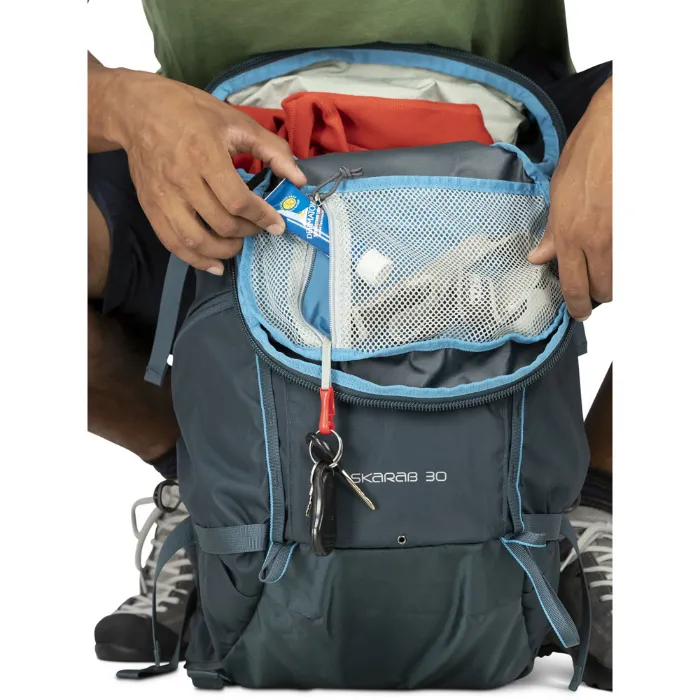
While it’s clear that the Skarab/Skimmer packs are stellar for day hikes or as a handy carry-on for your travels, they don’t come with external straps or hooks for bigger gear like sleeping bags or mats.
This isn’t a deal-breaker for most day-trip hikers, but something to keep in mind if you’re looking to pack for the long haul.
Verdict
The Osprey Skarab/Skimmer Hydration Pack is pretty much a hiker’s dream when it comes to lightweight, comfortable, and practical backpacks.
There might be a couple of minor tweaks I’d love to see in future versions, but all in all, it’s a standout choice for those who love to hit the trails without feeling weighed down.
REI Co-op Flash Air 50 Pack

KEY FEATURES
PROS
CONS
The Flash Air 50 is a marvel when it comes to weight. Weighing in at just 1 lb. 12 oz. to 1 lb. 15 oz., it might just make you do a double-take.
Seriously, finding another backpack with the same capacity that’s lighter? Good luck with that. It’s like they’ve defied the laws of backpack physics or something.

The best part is that with a capacity of 49-51 liters, it’s got more than enough room for all your things (and then some) – no matter if you’re setting off on a weekend jaunt or a multi-day trek.
The hip belt on this pack is fantastic. It’s got just the right amount of padding and snugness, making heavy loads feel lighter than they are. The pockets on the hip belt are a real treat too – perfect for stashing snacks or your phone, and they’re super easy to reach.

While I don’t mind the rolltop closure as much as some hikers, I’ll admit it took me a minute to get used to it compared to traditional closures. But once you get the hang of it, it works well, especially when it comes to adjusting the pack’s volume based on your load.
The Flash Air 50 also shines with its practical extras. The elastic cord around the rear mesh pocket is a nice addition for securing gear, and the removable mesh bags on the side and front strap are perfect for airing out wet items on the move.
Verdict
The REI Co-op Flash Air 50 Pack is a standout choice if you’re looking to lighten your load without sacrificing space or durability.
It’s a testament to what happens when smart design meets hiker needs. Whether you’re a seasoned thru-hiker or just getting started, this pack deserves a spot on your gear list.
Granite Gear Crown3 60 Pack

KEY FEATURES
PROS
CONS
For starters, it weighs just 2 lbs. 3 oz. to 2 lbs. 5 oz. With a whopping 60 liters of space, you can definitely fit in everything you need for an extended trip while still keeping the weight down.

For ultralight days, you can easily remove the framesheet and lower the pack weight to just 2 pounds.
What I particularily like is that this pack morphs into a daypack/fanny pack combo thanks to its removable hipbelt and top lid. Just clip the lid to the hipbelt, and you’ve got yourself a handy daypack with side pockets.
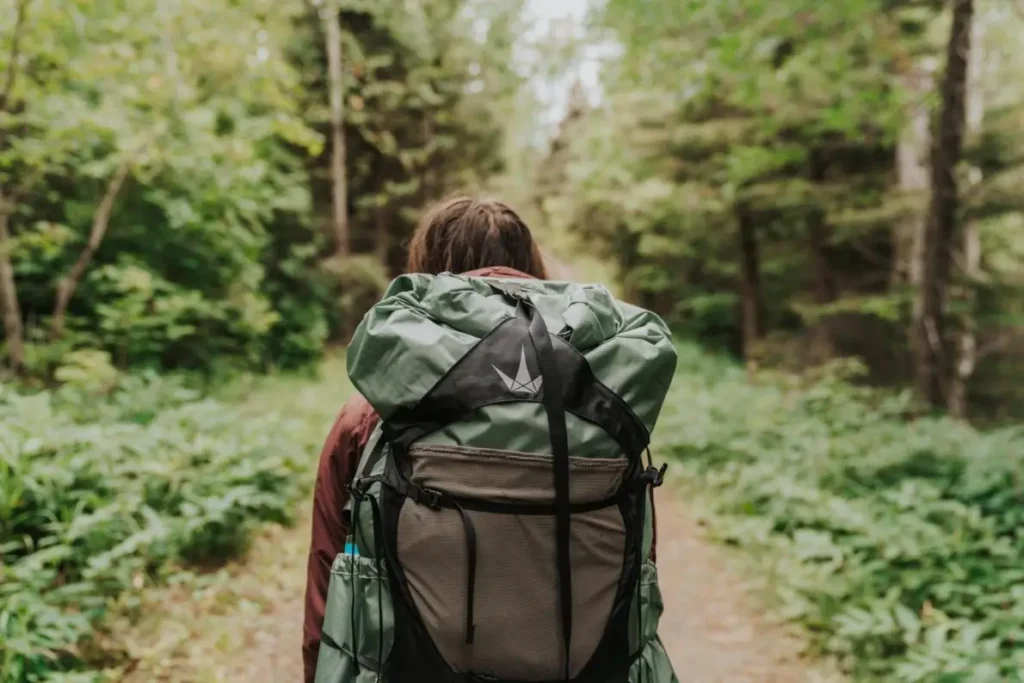
While I’m head over heels for the Crown3, there are a couple of things I’d tweak. For instance, it could really use a bigger clip for the water reservoir (there’s no internal pocket for it – just a clip). The current one does its job, but it’s a bit too small, making loading and unloading a bit of a problem.

Verdict
In terms of sheer versatility, size, weight, comfort, and quality, the Crown3 is hands-down a keeper. Whether you’re dipping your toes into the ultralight world or you’re a seasoned backpacker looking for a flexible gear setup throughout the season, this pack is exactly what you need.
To put it simply, the Granite Gear’s Crown3 60 Pack is a heavyweight in terms of functionality but a featherweight in carrying.
How to Choose a Lightweight Hiking Backpack?
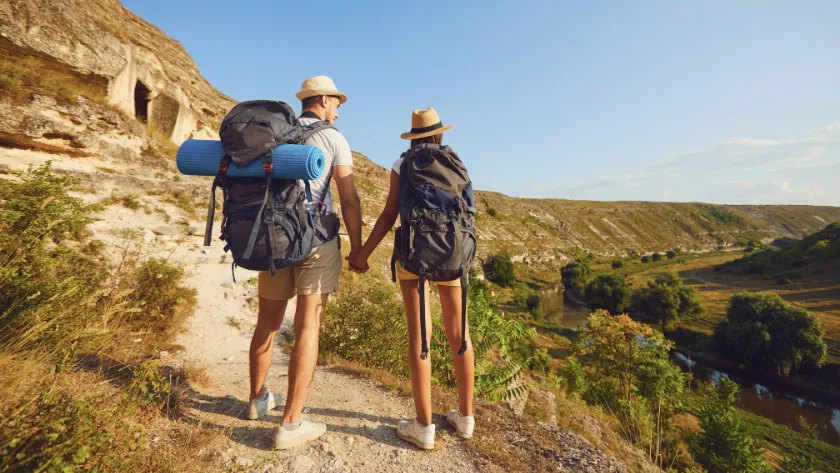
When it’s about selecting a lightweight hiking backpack, it’s a bit different compared to picking a regular pack. Every ounce matters when you’re miles away from your starting point, and your shoulders start to feel every bit of the load.
Consider the Size
I’m not just talking about how much it can hold, but how well it fits your body. A lightweight backpack that’s too big or too small is like wearing the wrong size shoes – it just won’t feel right. Look for one that matches your torso length and has adjustable straps to get a perfect fit.
Material
Lightweight backpacks usually have materials like nylon or polyester, which are great for keeping the weight down.
The material should be durable too. Check for terms like “ripstop” to ensure your pack can take on rough terrains without falling apart. Another important term you should look for is “denier” which refers to the density of threads used in the fabric. The higher the denier, the more durable the material.
Think About What You Need
Packing light is an art, and having a smaller backpack forces you to consider each item carefully. Do you really need to bring that extra pair of shoes? Probably not.
Opt for a backpack with a capacity of around 30-50 liters for trips that last a few days. It’s amazing how creative you can get with space when you need to.
Comfort Is Non-Negotiable
Just because a backpack is light doesn’t mean it should skimp on comfort. Look for padded shoulder straps, a supportive hip belt, and a back panel that keeps the air flowing.
Don’t Forget the Extras
Lightweight packs might not have all the bells and whistles of their heavier counterparts, but you still want some basic features.
Pockets for easy access, loops for your trekking poles, and hydration sleeve for your water bladder are all worth considering.
Conclusion
Going lightweight with your backpack is a perfect starting point because it might inspire you to lighten the rest of your gear.
Before you know it, you’re looking at lighter tents, sleeping bags, and even cooking gear. It’s a slippery slope but one that leads to more enjoyable hikes and less strain on your back.
One last thing, don’t just take my word for it. Getting hands-on with backpacks can make all the difference. If you can, pop into a store and try a few on for size. Load them up, adjust the straps, and walk around. It’s the best way to find your perfect match.

Lukas Heller
Hey there! I’m Lukas, co-founder of BigfootHiking.com, alongside my adventurous wife Martha. Originally from Germany, I landed in Phoenix, Arizona, in 2015, where I’ve been scouting out new trails ever since (though they’re getting scarce!). By day, I’m a software developer, but my heart belongs to hiking – I’m always plotting our next trip. When I’m not coding or on the trails, you’ll find me hanging out with our Pit Bull, Zeus.




